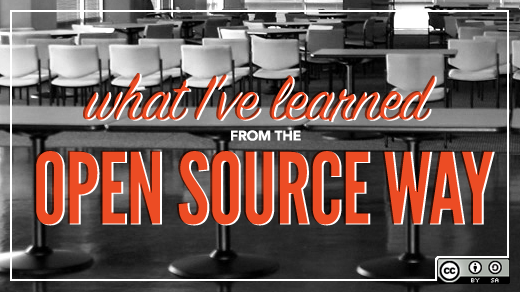Some people call patience a virtue. To me, it's the single toughest lesson I had to learn when joining an open organization.
It dawned on me recently in the middle of a class discussion with a group of MBA students at North Carolina State University. When I visited their classroom a few weeks ago to chat about their assigned reading, The Open Organization, I was overwhelmed (but also overjoyed!) by the number of insightful questions the students posed during my short time with them. But one in particular stuck with me long after I left.
"What was the hardest thing you had to learn," one student asked me, "when you started working at Red Hat?"
Clearly, she wasn't the only person in the room who was wondering how I—someone who began her career as an intelligence officer for the United States Air Force and spent several years as a management consultant for large, traditional companies—managed to fundamentally change the way I think about leadership. Let me tell you: it wasn't easy. But after more than five years in an open organization, I've learned that patience is the key to success.
I've also come to understand how I can put that patience into practice when building a better place to work.
Let it build
Open organizations are typically meritocracies, places where reputation matters more than title, and a history of contributions to the group are a kind of social capital. Before I became EVP of Strategy and Corporate Marketing at Red Hat, I acted as a consultant for the company. Looking back at that critical time, I realize now just how important it really was. It allowed me to prove to Red Hatters that I understood their business and their culture before I stepped into a leadership role. By the time I accepted a job from CEO Jim Whitehurst, I'd already demonstrated that I could make contributions to the organization. Red Hatters tend to be skeptical of folks who haven't built their reputations over time. If I'd started in the position as an unknown, my transition would have been much rockier. By being patient and building credibility, I was able to be a much more effective leader from the outset.
Today I keep lessons I've learned about patience close in mind as I help others navigate the nuances of meritocracy. One risk of an open organization built on influence and reputation is that, if you aren't careful, you can inadvertently favor those with strong, vocal personalities. These folks are extremely valuable, of course, but sometimes they can drown other voices out of conversations. When confronted with new and challenging problems, some of us need time to retreat, assess, and absorb what we're hearing before we feel comfortable commenting and verbalizing our point of view. Here's what I do to help counteract this risk: I make a specific point of seeking those people out when we are contemplating difficult, complex, or demanding issues, because solving complicated problems requires a true plurality of opinions. Just listening to the loudest, most immediate voices might help you make decisions more quickly and easily. But checking in with a more diverse set of teammates will help you make better decisions, even if it takes longer and requires more effort. I try to empower teams to solve problems cross-functionally, then report back to everyone so we have buy-in from all levels. That's helped me build stronger foundations in many teams, especially when we're tackling complex topics. But, again, these processes take longer—and yes, that requires patience.
Pace yourself
Firms today, especially those in the technology business (like Red Hat), feel an intense pressure to increase their pace of innovation. And more than ever, they need to move rapidly to keep pace with the changes affecting their customers. As a result, there's a tendency to rush crucial decision-making to arrive at actionable solutions faster. But a little patience goes a long way toward making sure you don't make the wrong choices.
Here's one example: I've learned that any time you call a meeting to solve an important problem, you should automatically schedule a second meeting to discuss that very same issue. Use the first meeting to let everyone in the room express their opinions—really get everything off their chests—while you just listen. Patience is key here. At this point, jumping into the dialogue could put a kink in the flow of ideas that's emerging. You could channel energy away from ideation and toward implementation details—and you might stifle potentially good ideas before they actually arise. If it's a topic where you feel that you must vocalize your opinions, I would recommend getting an objective facilitator to guide the group. And if everyone in the room knows they'll have a second opportunity, they'll feel less hampered by the feeling that they need to solve it completely in just an hour.
Let everyone talk, document what you heard, and send that input around. Then let the individuals take a few days to process what they've heard. When they regroup, you'll be amazed by how effectively you're able to drive to a decision or action plan. Without a doubt, two meetings take longer than one. But be patient: You're investing in more fruitful collaboration between team members—and better results for customers.
Collaborate and deliberate
Jim loves telling people about his early days at Red Hat, especially the time he gave a team some instructions and they cheerfully told him they decided to ignore them. Even today, hearing this story makes me wince. I can't imagine what would have happened if I'd tried the same approach in the Air Force! But Jim loves telling this story because it reveals something important about leading an open organization: You need to recognize that you don't know everything. You need to trust that the people around you might just make a better decision than you can. And you need to empower them to do it.
But that kind of collaboration takes time (and a strong vision for success). Checking in with people, listening to their opinions, gauging reactions, revising plans—it all takes time, certainly more time than developing a plan by myself and dictating it to everyone. But as Jim says in The Open Organization, that extra effort up front translates into astonishingly quick execution times, because everyone involved in a decision feels included, heard, informed, and ready to contribute. Whenever I feel myself getting frustrated by the fact that collaboration is slowing us down, I remind myself of the payoffs. As a leader, you need to trust not only the people around you (who, again, typically know more than you do!), but also the process of careful and concerted deliberation.
You just need to be patient.






1 Comment